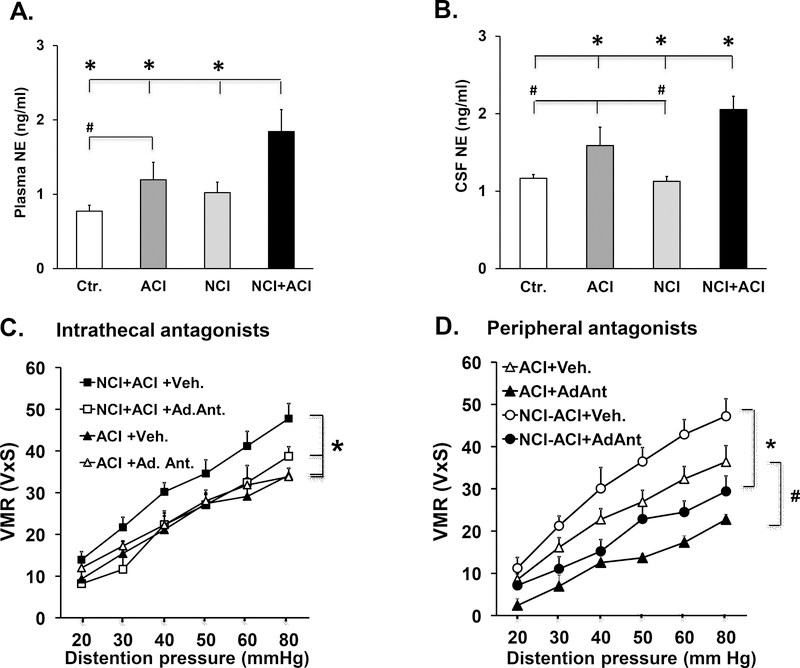Fig. 3:
Increased sympathetic activity contributes to enhanced visceral sensitivity in neonatal/adult inflammation rats. A. Graph showing plasma levels of norepinephrine one week after induction of adult colitis. We found significant main effects of neonatal colon inflammation F1,40=5.36, p=0.026 and adult colonic inflammation F1,40=10.3, p=0.003, n=10. The plasma norepinephrine levels were significantly elevated in neonatal/adult inflammation vs. adult colonic inflammation (*p=0.02), control (*p<0.001) and neonatal colon inflammation (*p=0.003) rats. The plasma norepinephrine levels were significantly elevated in adult colonic inflammation vs. control rats ( p=0.04). B. Graph showing norepinephrine levels in the cerebrospinal fluid. We found a significant neonatal colon inflammation x adult colonic inflammation interaction F1,40=4.57, p=0.039, n=10. Cerebrospinal fluid norepinephrine was significantly upregulated in neonatal/adult inflammation vs. adult colonic inflammation (*p=0.019), control (*p<0.001) and neonatal colon inflammation (*p<0.001) rats. The cerebrospinal fluid norepinephrine levels in the adult colonic inflammation rats were significantly greater than in control (#p=0.046) and in neonatal colon inflammation rats (#p=0.04). C. Graph showing the visceromotor response to colorectal distention in adult colonic inflammation and neonatal/adult inflammation rats that were treated intrathecally with either propranolol+phentolamine cocktail or vehicle. We found a significant interaction between neonatal colon inflammation and drug treatment: F1,28=9.31, p=0.006, n=6–7. Drug treatment significantly reduced the enhanced visceral hypersensitivity in neonatal/adult inflammation rats *p<0.001 compared to vehicle treatment. D. Graph showing the effects of systemic daily treatment with adrenergic antagonists propranolol and phentolamine on the visceromotor response to colorectal distention. We found significant main effects of neonatal colon inflammation F1,27=14.8, p=0.001 and adrenergic antagonists F1,27=48.2, p<0.001, n=6. Systemic adrenergic antagonist treatment significantly decreased visceral hypersensitivity in both in neonatal/adult inflammation and adult colonic inflammation groups of rats (neonatal/adult inflammation, *p<0.001 and adult colonic inflammation, #p<0.001). Separate groups of animals contributed to visceromotor response data and to tissue for molecular analyses.

